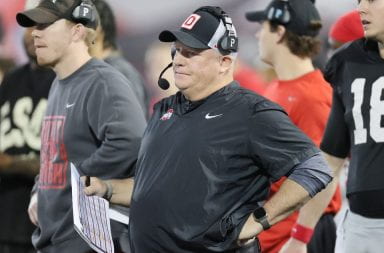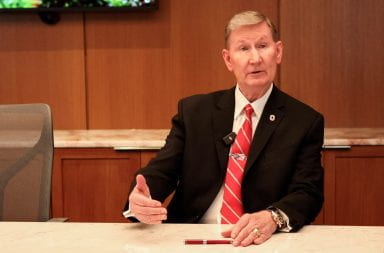After 59 games, Blue Jackets head coach Ken Hitchcock was finally fired.
For many, it comes as no surprise. For others, Hitchcock was a scapegoat for guilty parties all around.
But if you know anything about last season’s playoff berth and this season’s continued disappointment, Hitchcock’s departure should seem like a long-overdue farewell.
Ultimately, the problem lies herein: When you build a program enough to finally reach the playoffs, you send a message to fans and the NHL community that you’re becoming a legitimate team that can be taken seriously.
Yes, the Jackets are a newer program among teams with long-standing histories. Yes, the Jackets have the right to build a program for a few years and work out the kinks. No one holds that against any new team starting from the ground up.
But once you make it to the playoffs, it’s like a signal to the executives and stakeholders in the NHL that maybe you’re ready to be a respectable contender in the league. Next season should be a step forward, not a jog a mile back.
Last season the Jackets went 41-31-10 in 82 games for 92 points. That’s an adequate showing for a team that was finally breaking through.
The Jackets boasted 11 shutouts and were only shut out six times. They ended the season fourth in the Central Division and 16th in the League out of 30 teams. That’s not bad, especially when the Western Conference houses a majority of the best teams in the league.
At the time of Hitchcock’s firing, the Jackets were 23-27-9 with a total of 55 points on the season. While they’re 13-9-5 at home, they’re a disappointing 10-18-4 on the road. If that’s not enough, they went 2-9-5 in December and only 7-7 in January.
Now, you might be thinking, the season isn’t over yet and it’s too early to criticize and compare. But you have to take into account where they stand compared to last year.
In the Western Conference, the Jackets are 14th out of 15 teams. In the league standings, they’re 26th out of 30 teams. They currently sit nine points out of a playoff spot in conference. Can we say “letdown?”
But here’s the real kicker. While 18th in the league in goals for, the Jackets have fallen apart in the defensive zone, ranking 29th out of 30 teams in goals against. For a coach that is known for his defensive-minded planning, to be 29th in the league is ridiculous.
An even bigger indicator of a downward spiral is attendance. While the recession plays a role in diminishing numbers, after a playoff berth, the general consensus is that there is hype for next season. Ticket sales should go up.
But out of 27 home games this season, 16 of them have amassed crowds of less than 15,000. That’s 60 percent of home games pulling in less than 80 percent of seats. With 85.7 percent attendance last season, the numbers show another downturn in Blue Jacket enthusiasm.
While Steve Mason’s presence in goal has been dismal this season and the overall effort by the players is lacking, change needs to happen.
General Manager Scott Howson said this season has been disappointing all around for fans and the responsibility rests with management, coaches and players. But after announcing Hitchcock’s departure, he explained the most obvious reason.
Hitchcock “earned and received the opportunity to turn things around this season,” Howson said. “But unfortunately that has not happened and it has become apparent that change is in the best interest of our organization.”
Change. An example would be when Philadelphia Flyers General Manager Paul Holmgren decided to fire coach John Stevens in late November. The team was 13-11-1 and had 27 points on the season. For a team expected to perform well throughout the regular season and compete for the Stanley Cup, .500 hockey was simply unacceptable and a change was necessary.
Holmgren brought in Peter Laviolette to replace Stevens, and although the first few games under Laviolette showed no immediate response, in the past few weeks the Flyers have caught fire and are now in the playoff picture.
For the Jackets, change is something they need to end the season on a different note. Howson said the necessary change wouldn’t come from trading or releasing players or uprooting management.
For Hitchcock, his old-school style of coaching seems to be failing in an ever-changing, fast-paced age of hockey. To keep up, the Jackets made a change. A change for the better.


